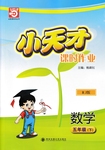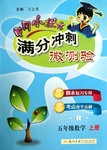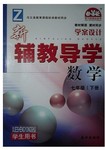题目内容
We parents have skyhigh hopes for our children. ___71____. What can we do to help our kids grow up to lead happy lives? According to the experts, we can do many things to help our kids.
___72____ In order to succeed,children need to feel they're good at something. So expose your children to as many interests as possible, and then let them choose those they like best. Applauded their achievements. A study found that students whose parents paid attention to their abilities were far more likely to do well in school and in life—than students whose parents didn't show such support. ____73___
____74____. Making his/her own decisions increases a child's sense of control and builds his/her selfesteem (自尊心). And allowing kids to make wrong decisions—so long as doing so won't harm them—helps kids learn from their mistakes.
Encouraging them to solve their own problems. As they grow, children need practice in communicating,standing up for themselves and compromising(妥协). One of the best places to learn these skills is at home. ____75____.
A) Help them to find their talents.
B) Let them make decisions and mistakes.
C) Don’t criticize the kids in front of the public.
D. We expect them to be confident and content.
E. The children will lead a happier life if given more freedom.
F. So celebrate your kids’ achievements, no matter how small they are.
G. So the next time your child runs to you complaining that her brother is blaming her,step back and let them work it out.
DAFBG

 小天才课时作业系列答案
小天才课时作业系列答案 一课四练系列答案
一课四练系列答案 黄冈小状元满分冲刺微测验系列答案
黄冈小状元满分冲刺微测验系列答案 新辅教导学系列答案
新辅教导学系列答案Most parents, I suppose, have had the experience of reading a bedtime story to their children. And they must have 11 how difficult it is to write a 12 children’s book. Either the author has aimed too 13 , so that the children can’t follow what is in his (or more often, her) story, 14 the story seems to be talking to the readers.
The best children’s books are 15 very difficult nor very simple, and satisfy both the 16 who hears the story and the adult who 17 it. Unfortunately, there are in fact few books like this, 18 the problem of finding the right bedtime story is not 19 to solve. This may be why many of the books regarded as 20 of children’s literature(文学) were in fact written for 21 . “Alice in wonderland” is perhaps the most obvious of this.
Children, left for themselves, often 22 the worst possible interest in literature. Just leave a child in a bookshop or a 23 and he will more willingly choose the books written in an imaginative way, or have a look at most children’s comics(连环画), full of the stories and jokes which are the objections of teachers and right-thinking parents.
Perhaps we parents should stop 24 to brainwash children into accepting our taste in literature. After all children and adults are so 25 that we parents should not expect that they will enjoy the same books. So I suppose we’ll just have to compromise(妥协) over the bedtime story.
| 【小题1】 |
|
| 【小题2】 |
|
| 【小题3】 |
|
| 【小题4】 |
|
| 【小题5】 |
|
| 【小题6】 |
|
| 【小题7】 |
|
| 【小题8】 |
|
| 【小题9】 |
|
| 【小题10】 |
|
| 【小题11】 |
|
| 【小题12】 |
|
| 【小题13】 |
|
| 【小题14】 |
|
| 【小题15】 |
|
On the whole, it’s not something we parents shout about, but one in four of us does it. Hiring private tutors for our children is now widespread.
“It’s expensive, but worth it,” says Ashan Sabri, whose daughter Zarreen, is having tuition in biology and chemistry in preparation for A-levels this summer. “My husband and I tried to tutor her at home, but we found all our knowledge was out of date and we were only confusing Zarreen. We also tried a group revision course but all the children were sitting in a room for different kinds of exams. On the whole, we think one-to-one tuition works best.”
The real reason is: does tutoring do any good?
“It’s not the magic bullet,” says Professor Judith Ireson, author of a 2005 Institute of Education report on the subject. “It’s still up to the child to do the learning. If he or she isn’t interested, sending them to a private tutor won’t do any good. However, we did find that students who had private tuition in mathematics during the two years before GCSE achieved on average just under half a grade higher than students who did not have a tutor.”
In which case, surely it’s time to break open the champagne? Not necessarily, says Elaine Tyrrell, head of The Rowans School, Wimbledon, a preparation school which regularly gets children into the best private schools.
“While we recommend private tutoring for a few children whose first language isn’t English, we don’t encourage it for the others. With the level of education they get here, children really ought to be able to pass the entrance exams without any extra teaching. And our worry is that they might just get used to getting help from last-minute tutoring, but, once they actually get to that school, they won’t be able to cope.”
But Mylene Curtis, owner of Fleet Tutors, one of the biggest tutoring agencies in the country, holds a different view.
“In some respects, the hurdles children have to leap in order to get into these schools are set at a higher level than the reality,” says Curtis. “We often find that, once a child has got into a school, the standard of work isn’t as high as was feared. The trick is to do well enough in the exam to win a place.”
【小题1】What does Ashan Sabri think of the group revision course?
| A.It’s expensive but worthwhile because it works the best. |
| B.It confuses students because the knowledge taught in it is out of date. |
| C.It isn’t effective because it doesn’t focus on specific exams. |
| D.It is effective because it doesn’t focus on specific exams. |
| A.Something that cannot help to solve problems at all. |
| B.Something that solves a difficult problem in an easy way. |
| C.Something that seems useful but has no use at all. |
| D.Something that encourages interest in study. |
| A.effective in language learning but not for exams |
| B.effective for foreign students but not for local students |
| C.unnecessary in most cases and may harm the further study of students |
| D.unnecessary in secondary school but helpful to further study |
| A.Fleet Tutors and the Rowans School are competitors. |
| B.Entrance exams to schools are too difficult for most students. |
| C.Further study isn’t as difficult as was first thought. |
| D.Private tuition is worth the financial investment. |
| A.Critical | B.Objective | C.Supportive | D.Uninterested |
On the whole, it’s not something we parents shout about, but one in four of us does it. Hiring private tutors for our children is now widespread.
“It’s expensive, but worth it,” says Ashan Sabri, whose daughter Zarreen, is having tuition in biology and chemistry in preparation for A-levels this summer. “My husband and I tried to tutor her at home, but we found all our knowledge was out of date and we were only confusing Zarreen. We also tried a group revision course but all the children were sitting in a room for different kinds of exams. On the whole, we think one-to-one tuition works best.”
The real reason is: does tutoring do any good?
“It’s not the magic bullet,” says Professor Judith Ireson, author of a 2005 Institute of Education report on the subject. “It’s still up to the child to do the learning. If he or she isn’t interested, sending them to a private tutor won’t do any good. However, we did find that students who had private tuition in mathematics during the two years before GCSE achieved on average just under half a grade higher than students who did not have a tutor.”
In which case, surely it’s time to break open the champagne? Not necessarily, says Elaine Tyrrell, head of The Rowans School, Wimbledon, a preparation school which regularly gets children into the best private schools.
“While we recommend private tutoring for a few children whose first language isn’t English, we don’t encourage it for the others. With the level of education they get here, children really ought to be able to pass the entrance exams without any extra teaching. And our worry is that they might just get used to getting help from last-minute tutoring, but, once they actually get to that school, they won’t be able to cope.”
But Mylene Curtis, owner of Fleet Tutors, one of the biggest tutoring agencies in the country, holds a different view.
“In some respects, the hurdles children have to leap in order to get into these schools are set at a higher level than the reality,” says Curtis. “We often find that, once a child has got into a school, the standard of work isn’t as high as was feared. The trick is to do well enough in the exam to win a place.”
1.What does Ashan Sabri think of the group revision course?
|
A.It’s expensive but worthwhile because it works the best. |
|
B.It confuses students because the knowledge taught in it is out of date. |
|
C.It isn’t effective because it doesn’t focus on specific exams. |
|
D.It is effective because it doesn’t focus on specific exams. |
2. What do the underlined words “magic bullet” in Paragraph 4 mean?
|
A.Something that cannot help to solve problems at all. |
|
B.Something that solves a difficult problem in an easy way. |
|
C.Something that seems useful but has no use at all. |
|
D.Something that encourages interest in study. |
3.According to Elaine Tyrrell, private tutoring is _______.
|
A.effective in language learning but not for exams |
|
B.effective for foreign students but not for local students |
|
C.unnecessary in most cases and may harm the further study of students |
|
D.unnecessary in secondary school but helpful to further study |
4. What can be inferred from the last two paragraphs?
|
A.Fleet Tutors and the Rowans School are competitors. |
|
B.Entrance exams to schools are too difficult for most students. |
|
C.Further study isn’t as difficult as was first thought. |
|
D.Private tuition is worth the financial investment. |
5.What attitude does the author hold towards home tutoring?
|
A.Critical |
B.Objective |
C.Supportive |
D.Uninterested |